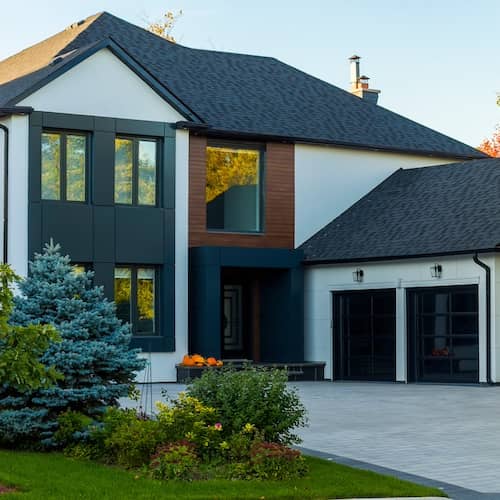How much is homeowners insurance?
Author:
Victoria ArajApr 4, 2024
•6-minute read
There are several different kinds of expenses to be aware of as you become a homeowner and start understanding your new financial situation. Homeowners insurance (sometimes called “home insurance”) is one of those costs, and is meant to cover the full value of your home/property if any damage occurs. Not only does this type of insurance protect you and your home, but it also protects your mortgage lender.
Now let’s discuss how much you can expect to pay for homeowners insurance as well as how it’s paid, and what states have the highest and lowest insurance premiums.
Table of contents
How do I pay for homeowners insurance?
One common way to pay for homeowners insurance is through an escrow account. This type of account uses the money from your monthly mortgage payments and puts it towards things like homeowners insurance and property taxes. If you have an escrow account, you can use that account to pay for your homeowners insurance which means you won’t end up having to pay a large amount out of pocket every year for your premium.
If you don’t have an escrow account, home insurance can also be paid directly whenever you plan on making your payment (monthly, yearly, etc.).
What causes homeowners insurance to increase?
There is always a chance that your homeowners insurance could increase. Here are some reasons as to why it could go up.
If you submit a claim
Your homeowners insurance could increase if you’ve submitted a claim due to damage done to your home/property. The amount your insurance increases is dependent on the severity of the damage, the type of claim, your claims history, etc. For example, a claim related to theft will most likely cause an increase in your rate while filing a claim after a natural disaster or a weather event will usually not increase your rate. Keep in mind that insurance companies have different regulations depending on the state you live in.
If you build an addition
Since the size of your home and property is one of the factors that determines how much your home insurance could cost, if you add to that square footage, your insurance could increase. For example, let’s say you decide to add on a bedroom and bathroom to the first floor of your house. Since this is going to add significant square footage to your house, you’re going to need more coverage to account for this new addition.
If costs rise
It’s also common for homeowners insurance to rise every year. Since inflation also plays a role in how much homeowners insurance you pay, the increased cost of materials and various household appliances could make your insurance increase. Insurance companies need to make sure they are appropriately accounting for market inflation, which then trickles down to an increase in your premium.
If you add more coverage
Since there are different types of coverage options you can choose from when it comes to homeowners insurance, there is always a chance that you could end up wanting more coverage. With more coverage, comes a higher cost.
How to reduce your homeowners insurance
It is possible to lower the amount you pay in homeowners insurance. Here are some ways you can try to reduce your premium:
- Improve your credit score: Having a good credit score can make you look more reliable to homeowners insurance companies. Repairing your credit score can help you get a lower premium.
- Keep up with household safety devices: Installing and updating devices around the home that will make it safer (smoke and carbon detectors, new electrical and home security systems, etc.) is a simple way to possibly get a discount from a homeowners insurance company. This is especially important for older homes that may not have updated safety features and systems.
- Compare insurance quotes: Gathering homeowners insurance quotes from various companies can help you make sure you’re getting the best plan for your needs. If you find a better quote, you can switch insurance companies and save money.
- Explore bundling: Most insurance companies offer bundling options in order to bundle home and auto insurance together. This could save you money on your premium.
- Increase your deductible: By increasing your deductible, you will pay less on your premium, but if you file a claim, you’ll have to pay more of your own money to fix the damage done to your home or property.
Average cost of homeowners insurance by state
Now that we’ve discussed what contributes to the overall cost of homeowners insurance, let’s break down the average cost by state.
Top 10 states with the lowest premiums
Here are the top 10 states with the lowest homeowners insurance premiums.
| State | Average annual homeowners insurance cost |
|---|---|
|
Hawaii |
$364 |
|
Utah |
$643 |
|
Nevada |
$745 |
|
Oregon |
$784 |
|
New Hampshire |
$802 |
|
Vermont |
$845 |
|
New Jersey |
$858 |
|
Delaware |
$872 |
|
Pennsylvania |
$884 |
|
Wisconsin |
$949 |
*This is based on home insurance with $350,000 in dwelling coverage, $175,000 personal property coverage and $100,000 in liability insurance.
Top 10 states with the highest premiums
Here are the top 10 states with the highest homeowners insurance premiums.
| State | Average annual homeowners insurance cost |
|---|---|
|
Oklahoma |
$3,651 |
|
Louisiana |
$3,549 |
|
Mississippi |
$2,734 |
|
Nebraska |
$2,591 |
|
Texas |
$2,547 |
|
Kansas |
$2,525 |
|
Florida |
$2,512 |
|
Georgia |
$2,332 |
|
Kentucky |
$2,206 |
|
Colorado |
$2,164 |
*This is based on home insurance with $350,000 in dwelling coverage, $175,000 personal property coverage and $100,000 in liability insurance.
If you have questions about the specific homeowners insurance cost in your area, please reach out to your local providers for quotes.
Top 5 Homeowners Insurance Companies By Cost
Here are the top five homeowners insurance companies ranked by lowest cost.
| Insurance company | Average annual homeowners insurance cost |
|---|---|
|
Progressive |
$746 |
|
Westfield |
$1,164 |
|
USAA |
$1,243 |
|
American Family |
$1,251 |
|
Nationwide |
$1,309 |
*This is based on home insurance with $350,000 in dwelling coverage, $175,000 personal property coverage and $100,000 in liability insurance.
FAQs about the cost of homeowners insurance
Let’s answer some of the most frequently asked questions regarding the cost of homeowners insurance.
What determines the cost of my homeowners insurance?
The cost of homeowners insurance varies depending on many factors, such as the property type, the type of insurance coverage you’re looking for, the amount of coverage you’d like, the state you live in, the age and condition of your home and many other important factors.
Why did my home insurance go up?
There are many reasons as to why your homeowners insurance could increase. This can happen due to market inflation, a change in your coverage, an increase in claims and if you end up adding square footage to your home.
Do I pay my homeowners insurance monthly or yearly?
If you’re using an escrow account to pay for your homeowners insurance, that payment will usually be processed yearly. If you aren’t using an escrow account, you can choose how you’d like to make this insurance payment (yearly, monthly, semi-annually, quarterly).
Can I lower the cost of my homeowners insurance?
The amount you pay in homeowners insurance can decrease. You can focus on decreasing this cost by having a good credit score, comparing quotes from different insurance companies, bundling home and auto insurance, increasing your deductible and installing updated safety features to your home. These are just some of the ways you could try to lower your home insurance cost.
The bottom line
The cost of homeowners insurance varies depending on the area you live in, the type and amount of coverage you’re looking for, the size and age of your home, your credit score and more. However, paying for homeowners insurance should be easy and painless if you have an escrow account that will allow your mortgage lender to pay it automatically for you. Planning for this cost is important as you decide what kind of coverage you’re looking for in order to protect your home.
If you’re feeling educated and ready to become a homeowner, start your mortgage application today.
Victoria Araj
Related resources

1-minute read
Amrock is now Rocket Close℠
Amrock, the nationwide title, mortgage settlement, and appraisal management company, is now Rocket Close.
Read more

4-minute read
What to expect after closing on a home
The paperwork has been signed and you’ve got the keys in hand. Now what? Here’s what to expect after closing on a home.
Read more
6-minute read
What is a home warranty and how much does it cost?
A home warranty is a contract covering the repair or replacement of household appliances and home systems. Learn how it works and average plan prices.
Read more